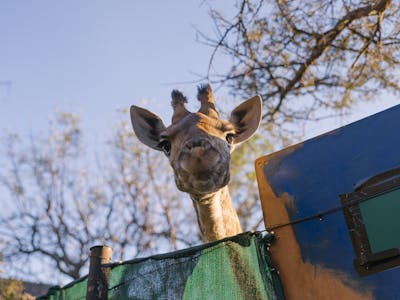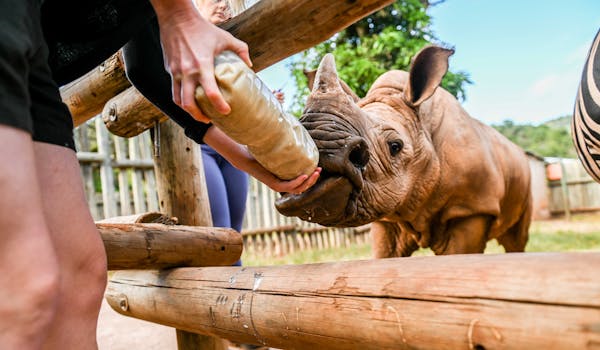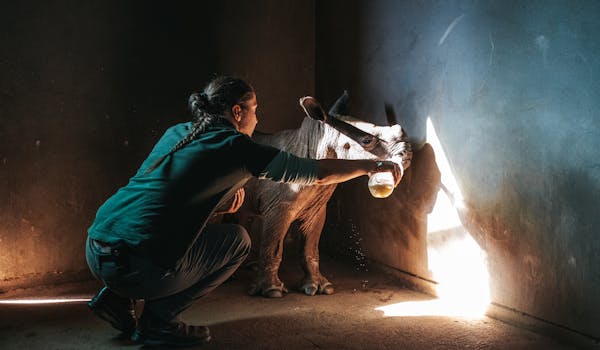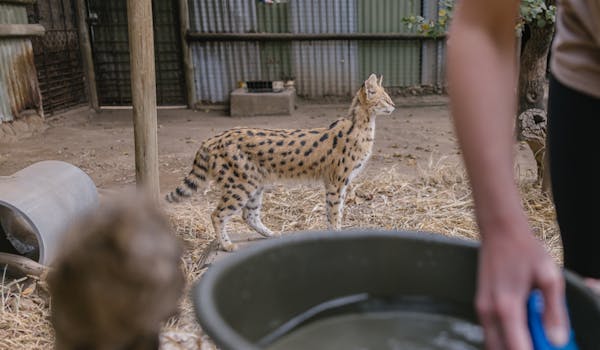Make it yours
Every experience is customised to be just right for you.

There’s no greater commitment to animal welfare than helping sick, injured and rescued animals on their long journey back to the wild. Or providing a lifetime of sanctuary to those who can no longer survive in their natural habitat.
Volunteering at Moholoholo, you’ll get involved with every aspect of animal care and rehabilitation. From preparing enrichment activities for resident predators to helping maintain the enclosures of long-term residents like honey badgers, leopards or birds of prey. You may also find yourself supporting veterinary staff during routine health checks or helping to comfort an orphaned animal adjusting to life in care.
If you’re lucky, you may also experience the unforgettable moment one of Moholoholo’s residents is safely returned to the wild. The road leading up to this day is often long and challenging. But seeing the journey through to the end is an experience that’s simply impossible to describe.



Participate in animal care work with a wide variety of animals - including charismatic and threatened species such as lions, leopards, cheetahs, wild dogs, hyenas, honey badgers, servals, caracals, bushbabies, vultures and antelope.
Moholoholo addresses a genuine need for animal rehabilitation and sanctuary in the Kruger National Park region. With its huge wildlife populations and proximity to human settlements, this important protected habitat sees high numbers of injured, hurt and orphaned animals every year - who only survive because of this project.
Moholoholo works in partnership with the EWT, a world-leading authority in wildlife conservation. By joining the project, you’ll learn about their critically important work, including the protection of endangered vultures.
As one of the biggest wildlife sanctuaries in South Africa with its own on-site clinic, Moholoholo gives you the chance to experience the realities of feeding, cleaning, vet nursing and enriching the lives of many incredible animals.
Moholoholo is surrounded by a 1,000-acre wildlife reserve where some of the centre’s animals are given long-term sanctuary. During guided game drives you’ll see species in the wild and learn anti-poaching techniques, animal tracking skills and bushcraft. All in a spectacular natural environment.
Join a professional project team that works in partnership with the EWT to save endangered vultures and other raptors by looking after poisoned birds and providing them with a safe feeding area (called a vulture restaurant).
Learn about and support the centre’s strong relationships with local farmers and landowners, which are essential for managing human-wildlife conflict and minimising threats to wildlife.
You’ll support the project team with a variety of hands-on animal care and conservation activities. Depending on the animals being cared for and the centre’s priorities at the time, this will include a range of the following responsibilities.
Wherever possible, you’ll help to rehabilitate healthy animals back into the wild. Where an injury is too severe or an animal’s territorial nature and complex social structures make it impossible to release them, you’ll help provide life-long care in the sanctuary instead.
You will get to observe or assist:
You could also observe or assist:
As well as working in a wildlife sanctuary, you’ll have the opportunity to be involved in research and practical conservation work.
You will get to observe or assist:
You could also observe or assist:
Most animals arrive at wildlife rehabilitation centres with some level of injury or trauma. Depending on your skill level, you could work under the supervision of specialist project staff to observe or assist:
Looking after young animals can be particularly rewarding but they require lots of special attention - just like human infants, in fact! Depending on your skill level, you could work under the supervision of specialist project staff to observe or assist:
You could get to experience a selection of additional activities:
You’ll learn about the care and rehabilitation of many different species, as well as their behaviour, biology, ecology, and conservation issues. Depending on the animals being cared for and the centre’s work at the time, this will include a range of the following topics.
This project contributes to a variety of the UN’s Sustainable Development Goals. As part of the team, so will you.
The content of this publication has not been approved by the United Nations and does not reflect the views of the United Nations or its officials or Member States.

Alongside animal work, Moholoholo doubles as an educational centre. Over 300,000 local primary and secondary school children have visited the project to learn about wildlife care and conservation from the project’s expert team.
In partnership with us, Moholoholo also provides financial support for a nearby creche and agricultural training centre. These initiatives provide vocational training and support for local people to find and keep good jobs.

Moholoholo provides equal employment opportunities for local women and men and equal volunteering opportunities for women and men outside the local community.

Moholoholo conserves important inland freshwater ecosystems through the rehabilitation and release of keystone aquatic species.

Moholoholo routinely employs young people between 15 and 24 and provides equal employment opportunities for local men and women. Volunteers provide both economic and physical support, facilitating important conservation work and education within the local community.

Moholoholo requires participants to pay for volunteering, which supports their conservation and community activities. They offer a reduced rate for South African volunteers to promote inclusion among local people.

Moholoholo protects the world’s natural heritage through conservation, via the rehabilitation and safe release of African species.

Moholoholo promotes responsible tourism in a variety of ways: through the creation of local jobs; via community work that sustains local cultures; by educating international and local visitors how to live in harmony with nature; and in its vital conservation work.
The project also takes a responsible approach to the consumption and disposal of resources - from recycling waste to using carcasses of deceased animals in their ‘vulture restaurant’, an important breeding site for endangered vulture species.

Moholoholo takes significant action to halt the loss of biodiversity and prevent the extinction of threatened species. By rehabilitating and releasing sick, injured and poisoned wildlife, they play a powerful role in preventing the degradation of South Africa’s forest, wetland, mountain and dryland ecosystems.
The project also takes urgent action to prevent poaching, by rescuing the animal victims of mass poisoning events before they pass into the hands of poachers. The centre also educates visitors on the poaching crisis and deters poachers from entering the surrounding reserve.

Through their work in treating the victims of mass poisonings, and the activity in the centre and surrounding reserve, Moholoholo are combating poachers and reducing the unethical practices associated with their activities.

Through Moholoholo’s partnership with us, they draw in financial resources that are used to fund conservation and provide support to their community partners in South Africa.
Related experiences
Explore programs similar to this one.

Help save the rhino at the largest specialist rhino care centre in Africa
View details for Care For Wild Africa Rhino Sanctuary
Experience daily life working with orphaned baby rhinos, supervised by a dedicated team of experts
View details for Golola Rhino Orphanage And Rehabilitation Centre
Make a meaningful difference at two of South Africa's most respected wildlife rehabilitation centres
View details for The Immersive Wildlife Rehabilitation Experience